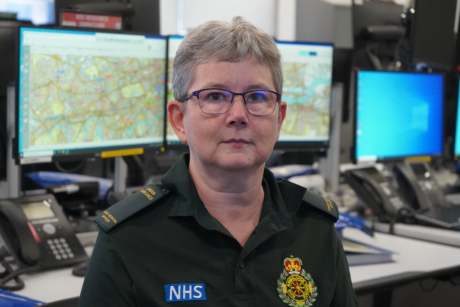Fenella Wrigley’s story – remembering 7/7

Dr Fenella Wrigley MBE – Chief Medical Officer, then London’s Air Ambulance doctor
The day before I had completed my training period and been formally “signed off” as a doctor on London’s Air Ambulance so 7/7 was my first full day. I was at the Royal London Hospital helipad for a team meeting with many of our doctors and paramedics.
We had just begun the meeting when we were made aware of an incident happening. I was sent initially to Aldgate where passengers and patients were being brought out of the tunnel. I was allocated a patient who was very seriously injured and we took that patient into the back of an ambulance, assessed them, gave them pain relief, gave them oxygen, then took them very rapidly to the Royal London.
We handed our patient over to a team at the hospital and we were given additional kit which included drugs, fluids, oxygen, syringes and needles. We were dealing with a lot of blast injuries so loss of limbs – what I imagine our armed forces medics would see when they’re in a warzone.
I was subsequently sent to King’s Cross and, after assessing a range of injured patients, was asked to assist with the care of a very seriously injured patient who had immediately life-threatening injuries. I supported the ambulance crew to get that patient onto the back of an ambulance and after assessing them I gave the patient pain relief, and intravenous fluids and oxygen. We set of to the Royal London and I continued to talk to the patient and also support the ambulance crew who were young and had probably not seen this degree of trauma before.
The patient became more unwell as we travelled to the Royal London and went into cardiac arrest just as we were arriving. We started immediate life support with chest compressions and more intravenous fluid whilst we arrived at the hospital where we handed the patient over to the team at the Royal London. They continued to stabilise the patient sufficiently to get him to intensive care which at least allowed a period of time for his family to come and visit him before sadly he died.
Tragically a lot of families were not able to spend that time with their loved ones because their injuries were too severe and they died at the scene.
We went back to Kings Cross and carried on helping to assess the walking wounded patients until gradually the scene began to settle.
For me the most important thing was that the patients had people with them, reassuring them that they were safe, they were away for the scene, they were being taken to hospital, their family was being contacted and would come to them – that was as important probably as the medical care that we could give them.
I think the shock and the enormity of it was when you get home and you see it all coming together on the news and your realise what you’ve been involved in and just hope you’ve made a tiny bit of difference to somebody or somebody’s family and then a lot of time thinking afterwards, could I have done more.
Everybody worked together and looked out for each other. Everybody was doing the best they could for every patient whether they had serious injuries or less serious injures – every single patient and person had been exposed an incomprehensible situation that day.
That day probably changed my life and led me to come to work for London Ambulance Service and career has been centred around the Ambulance Service.
It’s really important to remember those who died and remember their families and friends and loved ones. But also we should remember that it brought out the best in people, the kindness, the caring and I think the remembering reminds people that by reaching out and being kind to people you can make a big difference.

Follow us on social media: